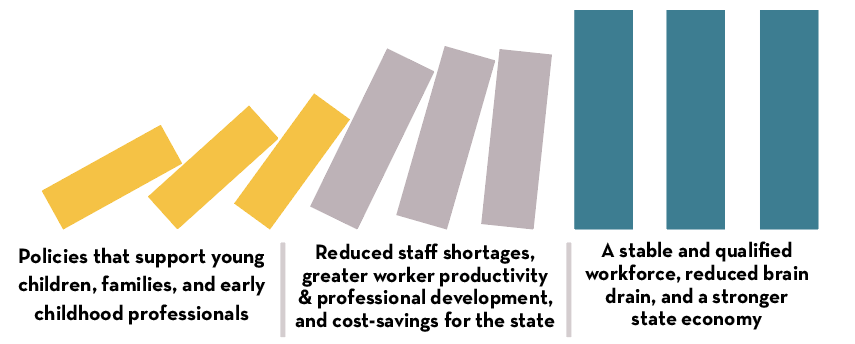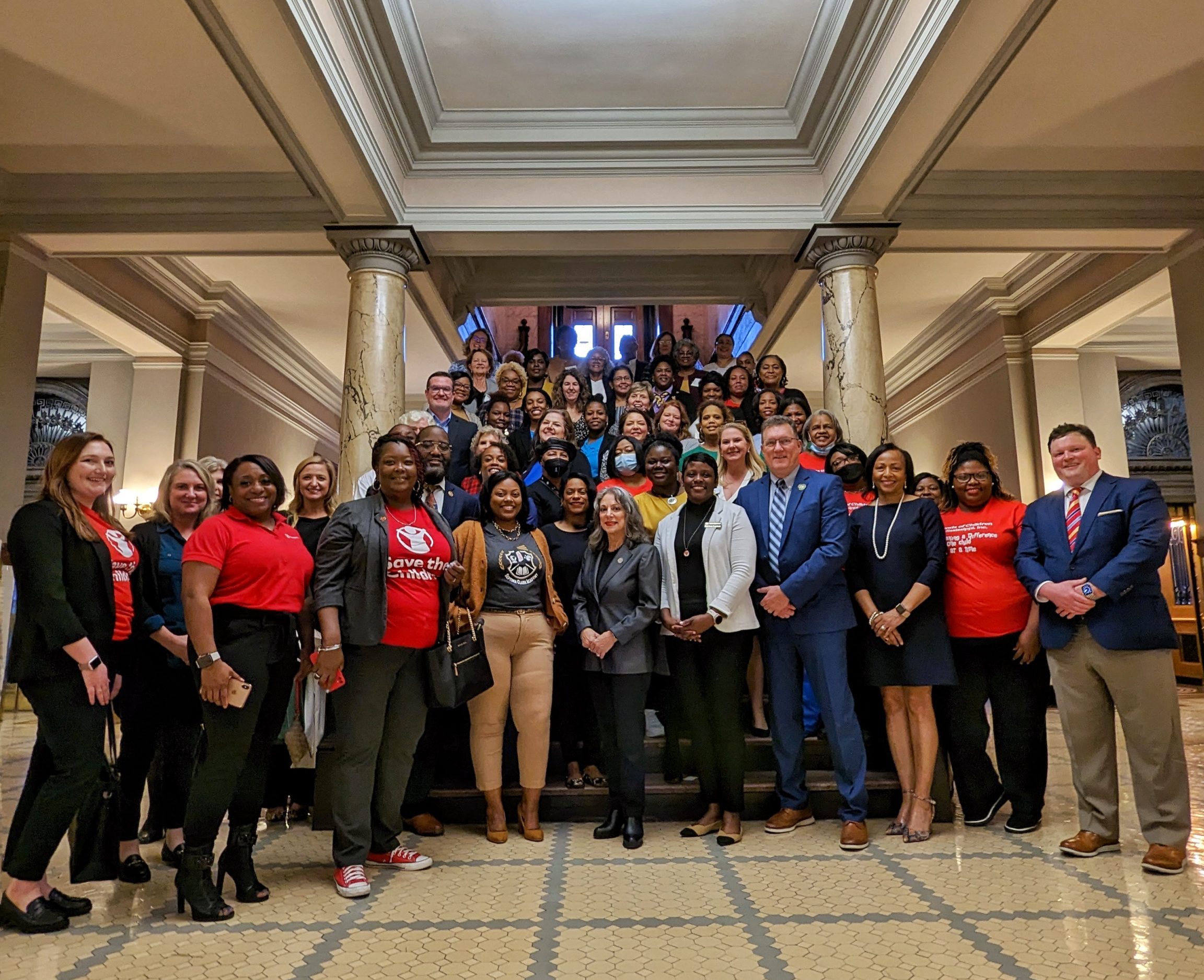Back in January of this year, over 80 people joined MELA and our partners from the Systems Change Lab of the Social Science Research Center at Mississippi State University, Excel by 5, and the Graduate Center for the Study of Early Learning for Early Childhood Capitol Day 2023 to show legislators the critical role that policy supports for childcare, postpartum healthcare, and early intervention services play in strengthening Mississippi’s workforce and overall economy. On Capitol Day, we shared four specific policy recommendations with lawmakers and the public. We believe that taking action on those four policy recommendations is one way to start a domino effect that reduces cross-sector worker shortages, cuts red tape, and strengthens our economy.

Progress Updates
We’re excited to share that two of our four recommendations have been enacted, and we are making strong progress toward the remaining two! Read on for specific updates.
POLICY RECOMMENDATION
Resolve the childcare staffing crisis by allocating lottery funds (or other unallocated funds) to a program that provides professional development and wage supplements directly to participating childcare staff.
UPDATE: This recommendation was not taken up by the legislature, but adequate compensation and professional support for childcare workers remains a high priority issue that is being explored by both Mississippi Forum for the Future and the Mississippi State Early Childhood Advisory Council (MS SECAC).
Mississippi Forum for the Future will be launching a working group to explore public, private, and philanthropic funding structures and revenue streams that could be used to provide increase or supplement childcare teacher wages and support a highly qualified early care and education workforce. Additionally, MS SECAC’s Workforce Committee has included several aligned recommendations in their draft Strategic Vision, most notably:
- Increase compensation to attract and retain professionals in the childcare field.
- Strengthen the recruitment and retention of high-quality personnel to ensure uninterrupted services in early childcare centers.
POLICY RECOMMENDATION
Increase single parents’ access to childcare by removing the requirement that they cooperate with child support enforcement to be eligible for the Child Care Payment Program (CCPP).
UPDATE: The requirement that single parents cooperate with child support enforcement is expected to be removed, effective May 15, 2023.
This recommendation was not taken up by the legislative committees, but as this requirement was a regulation and not a law, the Mississippi Department of Human Services can make this change with the Governor’s approval. As per the updated Child Care Payment Program Policy Manual, this requirement is being removed, pending final agency approval processes, and will not longer apply to starting May 15, 2023.
SPECIAL NOTE: The Mississippi Department of Human Services will be holding a public meeting to gather public comment on all proposed updates to the Child Care Payment Program Policy Manual. This virtual meeting will be held on Wednesday, April 12, 2023 from 11:00am – 1:00pm. If you would like to make a comment during that meeting, you must register in advance. You may also provide written comment before or after the meeting.
POLICY RECOMMENDATION
Create long-term cost-savings by reducing health problems and deaths associated with pregnancy: Continue Medicaid coverage through 12 months postpartum.
UPDATE: This recommendation has been signed into law! As of July 1, 2023, women who were eligible for Medicaid coverage during their pregnancies will remain eligible for Medicaid coverage through 12 months postpartum.
This recommendation was captured by Mississippi Senate Bill 2212. This bill was passed in both houses and signed into law by Governor Tate Reeves on March 16, 2023.
POLICY RECOMMENDATION
Create an Early Intervention task force and pilot project to study methods and models to increase the number of children served, keep qualified early intervention practitioners in the state, reduce special education costs when children enter school, and improve the lives of Mississippi children and families in need.
UPDATE: This recommendation was addressed across two bills: Senate Bill 2485 (passed and signed into law) and Senate Bill 2167 (passed by House and Senate, awaiting Governor’s signature). The first bill helps to expand and retain a qualified early intervention workforce in the state by broadening the qualification requirements for early intervention service providers. The second would establish a the recommended task force – but not a pilot project.
Senate Bill 2485 updates the definition of those considered qualified to provide early intervention services to include those with degrees in Human Development and Family Sciences or Child and Family Science with a concentration in child development and licensure in pre-K/K. This is designed to expand the pool of qualified applicants who can join the early intervention workforce in Mississippi.
If signed into law by the Governor, Senate Bill 2167 will establish a task force to study Mississippi’s implementation of First Steps (Mississippi’s Early Intervention Program). The task force would be composed of state officials, university faculty members, parents, pediatricians, psychologists, and representatives from local nonprofits, and would develop recommendations for potential reforms that could expand access to early intervention services. The bill originally also included a pilot project to explore the benefits of reorganizing First Steps, but this did not make it into the final version that was passed in the legislature.

